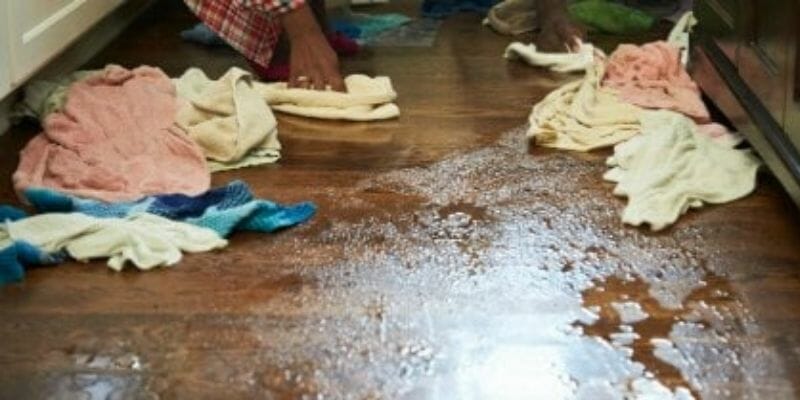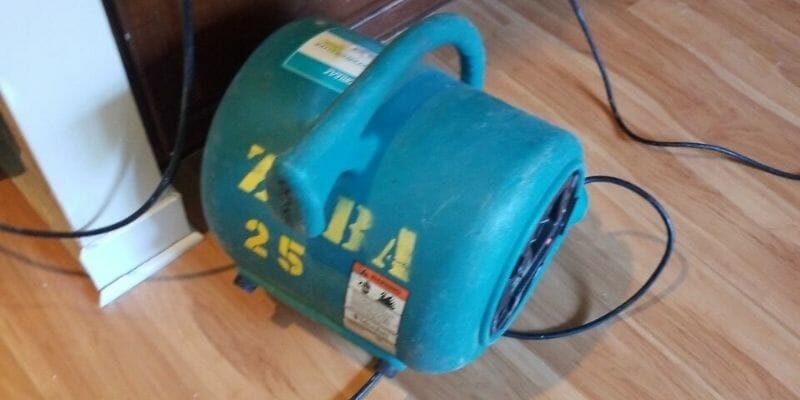Heavy rain filled the basement with water. You didn’t notice leaks under the kitchen sink until you smelled the mold. A broken fire sprinkler at work soaked office ceilings, walls and floors.
There are countless causes of water damage in Chicago homes and businesses, but they all have one thing in common:
They leave you wondering what to do now.
As the city’s leading water damage restoration professionals, we can help. We offer this guide for dealing with water damage to residential and commercial properties. It includes direct links to valuable information from the city of Chicago as well as national government websites.
Here’s everything you need to know.
How Does Water Damage Affect My Home?

If it’s not taken care of immediately, water damage in Chicago homes leaves behind serious problems. Mold growth in wood, drywall and duct work is always a concern especially for individuals dealing with health issues.
Extensive water damage in a house rots framing and compromises the home’s structural integrity. It can buckle subfloors, collapse ceilings and leave hidden damage in attics, walls and crawl spaces.
How Does Water Damage Affect My Business?

In addition to the same water damage issues that affect a home, a business faces unique problems. For example, stagnant water can threaten a building’s entire water supply system. Flooding at an industrial site can spread dangerous chemicals and contaminants.
The downtime involved in commercial water damage repair can have a negative impact on daily operations. Businesses can trust an experienced Chicago water damage restoration contractor like ServiceMaster Restoration by Zaba for repairs and cleanup that get the doors back open as soon as possible.
What Should I Do First?

Knowing what to do after water damage to your property makes a big difference in how fast you recover. It’s best to let professionals handle water damage restoration, but these DIY steps help jump-start the recovery process.
1. Shut Down the Source
If you can’t stop the leak or repair the broken pipe, locate and close your property’s water shut-off valve.
2. Secure the Area
Make sure standing water hasn’t created electrical hazards. Tell everyone to stay clear until you’re certain affected areas are safe.
3. Open Windows and Doors
Ventilate damp spaces by opening windows and doors. Set up fans to generate cross-currents of fresh air. If it’s humid outside, run fans with windows and doors closed.
4. Mop Up What You Can
Try to remove as much water as possible with old towels or mops and buckets. If you’re dealing with more than 1 inch of water, stay safe by letting water damage technicians handle the job.
5. Make Important Calls
Once you have things under control, it’s time to start making phone calls. Water damage in a home or business quickly spreads through the property. You need to move fast.
Who Should I Call First? 4 Calls You Need to Make
1. Your Insurance Company
Call your agent, and share as much as you know about the situation. Ask about your coverage details. Schedule an adjuster’s inspection as soon as possible. This important call is the first step in processing your water damage claim.
2. Chicago Water Damage Restoration Company

Contact a local business that specializes in water damage repair for properties in Chicago and the suburbs. You want to partner with a company like ServiceMaster Restoration by Zaba that understands the unique problems you might face such as backups from city water mains and is IICRC certified. An industry-certified restoration company can work with your insurance agent and streamline the claims process.
3. Chicago Department of Water Management
If you believe flooding in your basement might be the result of a water main backup, call the city’s DWM. Their office will dispatch crews to identify the problem in your area and take care of main line repairs. The department handles calls from property owners and renters.
4. Chicago Office of Emergency Management
Flooding can create electrical hazards and affect gas connections. If you need help shutting off your property’s utilities, contact Chicago’s OEM.
How Do I Handle Storm Flooding?

After severe weather, Chicago flooding often devastates area homes and businesses. When heavy storms blow through, rainfall can set new records and overwhelm the city’s aging infrastructure.
If you don’t carry flood insurance, talk with your agent about available options. Ask him or her to advise you on details that apply to your situation even if you currently rent.
Do all you can to flood-proof your property. Keep a professional water damage company on your contact list, and bookmark these helpful resources for dealing with Chicago storm flooding.
- National Weather Service – This NOAA site features information specific to flooding in Illinois. Take a look at past flood events, and learn about different types of area flood hazards.
- Federal Emergency Management Agency – FEMA is a trusted source for details about flood zones and risks. Chicago residents use the site to locate and review different community flood maps.
- Ready.gov – Published by the DHS, Ready.gov offers tips on staying safe during flood events. It also provides links to FEMA flood maps, wireless emergency alerts and the National Flood Insurance Program.
- Chicago Metropolitan Agency for Planning – CMAP’s 62-page overview of storm flooding in Illinois looks at how these natural disasters impact different parts of the state. The free download includes information about preventative flood planning on local, regional and statewide levels.
Are You Dealing With Water Damage in Chicago? We Can Help!

When water damage at your home or business leaves you wondering where to start, let us help. Take a look at the resource links we’ve provided. Put your contact list together, and keep our number handy.
For years, we’ve proudly provided the expert water damage repair that residents in Chicago and the suburbs depend on.
Here at ServiceMaster Restoration by Zaba, we’re always just around the corner, ready for your call: 773-647-1985
Plumbing problems are usually to blame for property water damage. Backed-up toilets, broken appliances, clogged HVAC lines and storm flooding are also common sources of water damage.
Costs range from $1200 to $4700. The average cost is $3000, but many factors impact the final cost including extent of damages and types of water involved.
From 2000 through 2018, Illinois residents experienced more than 1500 floods and flash floods, averaging 1.5 flood events every week.
The post Water Damage in Chicago? Here’s What to Do Right Now appeared first on ServiceMaster Restoration by Zaba.
source https://www.servicemasterbyzaba.com/blog/water-damage-chicago/
No comments:
Post a Comment